INTERNACIONAL
People in Gaza are thanking Trump for aid, leader of US-backed group says

NEWYou can now listen to Fox News articles!
The Gaza Humanitarian Foundation’s (GHF) new chairman is ignoring critics and keeping his focus on what he calls the group’s «singular mission» of making sure the people of Gaza have food.
«Our mission has nothing to do with Hamas. It has nothing to do with Israel. It has everything to do with making sure that hungry Gazans get food. That is our singular mission. No other mission,» Rev. Johnnie Moore, GHF’s executive chairman, told Fox News Digital.
Moore took the helm June 3, just a few days after the Israeli- and U.S.-backed aid group began its distribution operations.
Palestinians carry aid supplies from the U.S.-backed Gaza Humanitarian Foundation in Khan Younis in the southern Gaza Strip May 29, 2025. (Reuters/Hatem Khaled)
HAMAS WORKING TO ‘SABOTAGE’ TRUMP-BACKED AID GROUP WITH ‘FAKE NEWS’: ISRAELI OFFICIAL
Even before GHF began distributing aid, it faced criticism in the weeks leading up to its launch. The United Nations came out strongly against the group. U.N. Under-Secretary-General for Humanitarian Affairs and Emergency Relief Coordinator Tom Fletcher was a vocal critic, claiming the U.N. already had the infrastructure and ability to distribute aid.
Moore, however, believes GHF is «trying to solve a problem that the U.N. hasn’t been able to solve,» namely, the issue of Hamas stealing aid. Rather than admonish critics, Moore is urging them to join GHF’s efforts to get food to people on the ground in Gaza.
The GHF chief also noted that, despite what critics have said, Gazans have been «incredibly grateful» to receive the support. Not only have the beneficiaries been thanking the U.S., they’ve been thanking President Donald Trump. Moore attributes this to a promise the commander in chief made in the Oval Office.
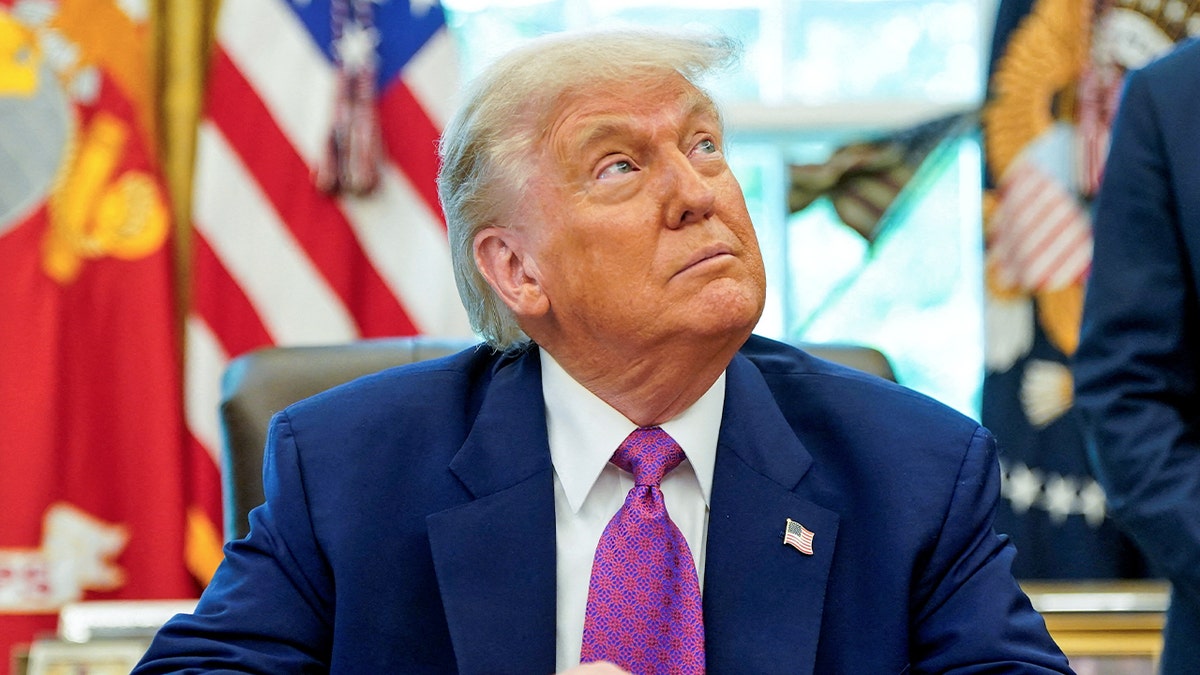
Rev. Johnnie Moore, GHF’s executive chairman, says Gazans receiving aid from GHF are thanking President Donald Trump because of a remark he made in the Oval Office. (Reuters/Nathan Howard)
US-BACKED GAZA AID GROUP PAUSES FOOD DISTRIBUTION AFTER DAYS OF VIOLENCE
«They’re thanking President Trump specifically because a few weeks ago, in the Oval Office, in one of the many, many press briefings that President Trump does, he made a passing comment,» Moore said.
«And the comment related to how Hamas was treating the Gazan people very badly when it came to humanitarian aid. And he made a promise that the United States would do something about it. And the people in Gaza are attributing our free distribution of food as a direct response to the promise of the president of the United States.»
Israel and the U.S. have repeatedly said that GHF is the best mechanism for distributing aid to Gazans and ensuring that Hamas does not get anything. Moore told Fox News Digital humanitarian aid officials have faced a «false choice» for years between Hamas and the people of Gaza.
«I think for many, many years, the aid community thought that the cost of giving aid to the people of Gaza is that you had to lose a certain amount of that aid to all of these other nefarious purposes. We’re just showing that that’s a false choice. That doesn’t have to be the case. We can actually give aid without facing these dilemmas,» Moore said.
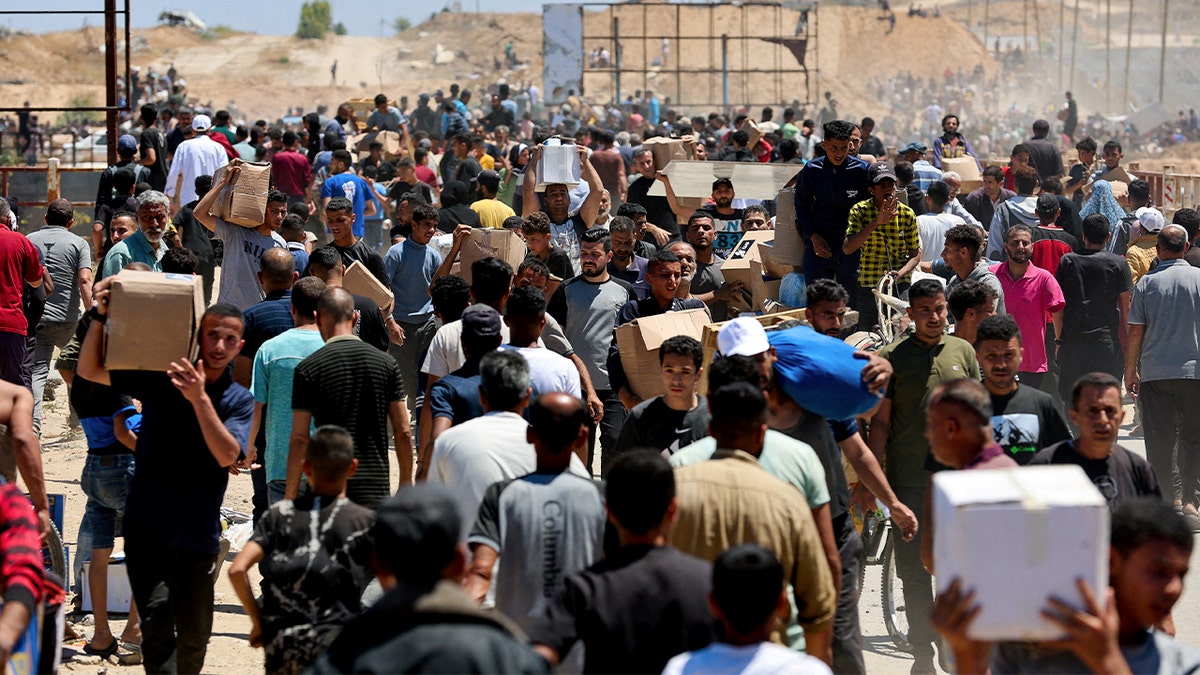
Palestinians carry aid supplies they received from the U.S.-backed Gaza Humanitarian Foundation in the central Gaza Strip May 29, 2025. (Reuters/Ramadan Abed)
TENSIONS RISE AS ISRAEL STRONGLY DENIES FIRING ON PALESTINIANS AT GAZA HUMANITARIAN SITE
«Since the Israeli authorities allowed the U.N. to resume bringing limited aid into Gaza after nearly 80 days of a total blockade of any supplies, there have been understandable instances of trucks carrying food being offloaded by hungry civilians,» Eri Kaneko, spokesperson for the U.N. Office for the Coordination of Humanitarian Affairs, told Fox News Digital.
«In some cases, we have also seen unacceptable looting by armed, criminal gangs, which posed tremendous risk to our drivers’ safety. To meet humanitarian needs in Gaza and help reduce looting, far more essential supplies should be allowed into Gaza through multiple crossings and routes.»
In late May, Israeli U.N. Ambassador Danny Danon revealed the international institution was using «mafia-like» tactics against NGOs that were open to working with GHF. The U.N. removed several NGOs from a shared aid database, which acts as a «central system for tracking aid deliveries into Gaza,» according to Danon.
The following week, after Danon exposed the U.N.’s actions, the U.S. vetoed a U.N. Security Council resolution calling for a ceasefire in Gaza. The resolution also addressed humanitarian aid, though Danon said it would have undermined, rather than advanced, such efforts.
CLICK HERE TO GET THE FOX NEWS APP
Just minutes before vetoing the resolution, U.S. Chargé d’Affaires Dorothy Shea urged the U.N. to support GHF «to help it safely deliver aid without being diverted by Hamas. The GHF has emphasized it will deliver aid consistent with the humanitarian principles of humanity, neutrality, impartiality and independence.»
INTERNACIONAL
Delcy Rodríguez aseguró que se realizarán elecciones “justas y libres” en Venezuela pero no fijó una fecha

La jefa del régimen de Venezuela, Delcy Rodríguez, aseguró en una entrevista con NBC News que está “absolutamente” comprometida a organizar “elecciones libres y justas” en el país, aunque precisó que la fecha de los comicios dependerá del diálogo político nacional.
En entrevista con la cadena estadounidense, Rodríguez respondió afirmativamente cuando la periodista Kristen Welker le preguntó si está dispuesta a celebrar elecciones.
“Absolutamente, sí”, declaró Rodríguez, según la traducción difundida por NBC News.
“Tendremos elecciones en este país justas y libres, por supuesto, como lo establece la Constitución”, añadió. Sin embargo, aclaró que el calendario electoral será decidido “por el diálogo político en este país”.
En la misma entrevista, Rodríguez confirmó que ha recibido una invitación formal para visitar Washington y que está dispuesta a concretar el viaje “una vez que establezcamos esta cooperación y podamos avanzar con todo”.
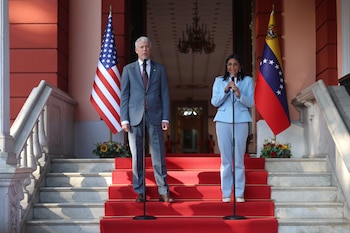
“Me han invitado a Estados Unidos. Estamos considerando ir allí una vez que establezcamos esta cooperación y podamos avanzar con todo”, señaló Rodríguez a NBC News.
La transición política venezolana ha estado marcada por la intervención de Estados Unidos, que ahora tutela la gestión de Rodríguez y exige la apertura del sector petrolero y la normalización institucional. El secretario de Energía de EEUU, Chris Wright, visitó Caracas esta semana y mantuvo una reunión con la líder chavista para abordar los próximos pasos del acuerdo energético y la hoja de ruta hacia la recuperación económica.
En declaraciones recogidas por The Wall Street Journal, Wright enfatizó que Venezuela atraviesa el inicio de una etapa de transición y que Delcy Rodríguez es consciente de que el proceso electoral es una condición necesaria para consolidar la cooperación.
“Estamos en las primeras semanas de un período de transición”, explicó Wright al periódico. Al ser consultado sobre la posibilidad de que Rodríguez acepte elecciones en un plazo de año y medio, Wright dijo: “Creo que sí. Ella es muy consciente de eso… Creo que reconoce que es una condición necesaria. Tenemos un plan. Ella conoce el plan”.
Delcy Rodríguez visitó junto a Chris Wright las instalaciones de una de las plantas que opera Chevron en la Faja Petrolífera del Orinoco, región que concentra las mayores reservas probadas de crudo en el mundo. Desde allí abogó por la eliminación de cualquier obstáculo en el acuerdo petrolero entre Venezuela y Estados Unidos.
“Chevron tiene más de 100 años en Venezuela y estamos haciendo un trabajo extraordinario, como socios que somos, mejorando producción, mejorando las instalaciones, la infraestructura y el mantenimiento y este es el camino de la cooperación”, afirmó.
Durante la entrevista con NBC News, Rodríguez reiteró que Maduro sigue siendo, a su juicio, el “presidente legítimo” de Venezuela. “Tanto el presidente Maduro como Cilia Flores, la primera dama, son inocentes”, afirmó.
La jefa del régimen chavista también respondió sobre la situación de la líder opositora María Corina Machado, premio Nobel de la Paz, quien se encuentra fuera del país.
Rodríguez advirtió que Machado “tendrá que responder ante Venezuela” si regresa y deberá explicar “por qué pidió una intervención militar, por qué pidió sanciones contra Venezuela y por qué celebró las acciones que tuvieron lugar a comienzos de enero”.
Enfatizó que, respecto a la seguridad de la opositora, no entiende “por qué hay tanto revuelo”, pero insistió en que deberá rendir cuentas ante la justicia venezolana.
El proceso de transición política ocurre junto a una serie de reformas económicas y legales. La Asamblea Nacional aprobó recientemente cambios en la Ley Orgánica de Hidrocarburos para facilitar la inversión extranjera y la participación de empresas estadounidenses en el sector energético, en línea con las exigencias de Washington para la recuperación económica del país.
(Con información de EFE y AFP)
Corporate Events,Diplomacy / Foreign Policy,South America / Central America
INTERNACIONAL
Americans could pay to bring back alleged members of ‘foreign terrorist cartel’ to US
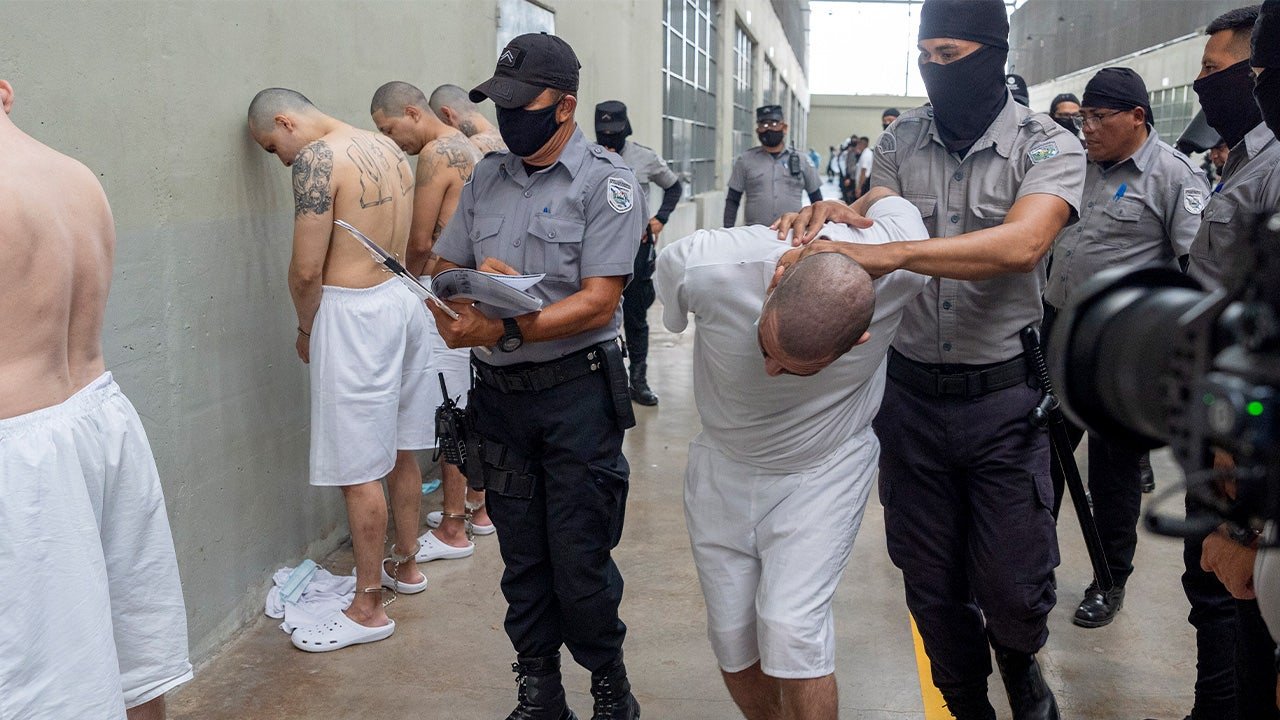
NEWYou can now listen to Fox News articles!
Alleged members of «foreign terrorist cartel» Tren de Aragua are set to be brought back to the U.S. after their deportations in 2025 — and it could come at taxpayers’ expense.
U.S. District Judge James Boasberg, who has repeatedly butted heads with the Trump administration, ordered the Trump administration on Thursday to facilitate the return of 137 migrants deported to a notorious prison in El Salvador in 2025, called CECOT.
Boasberg stipulated in his ruling that the government pay for the migrants’ airfare back to the U.S., meaning taxpayers are likely footing the bill.
Boasberg argued that it’s «unclear why Plaintiffs should bear the financial cost of their return in such an instance,» noting that, «this situation would never have arisen had the Government simply afforded Plaintiffs their constitutional rights before initially deporting them.»
FEDERAL JUDGE ORDERS DEPORTED VENEZUELANS TO BE RETURNED TO US
Courts rejected a misconduct accusation against Judge James Boasberg. (Associated Press)
The ruling comes as part of a nearly year-long saga, when the federal judge attempted to halt the Trump administration’s deportations of migrants to El Salvador under the Alien Enemies Act in March 2025.
The Supreme Court ultimately allowed the Trump administration to continue using the Alien Enemies Act to carry out deportations in April, but ordered that detainees receive notice and an opportunity to challenge allegations.
Boasberg has since been wading through legal avenues with the men in El Salvador, issuing a ruling in December that the Trump administration denied them their due process.
It is unclear how many of the men will actually take the offer and return to the U.S., with Boasberg noting that the noncitizens «would be detained upon arrival» back to the U.S.
Similar to Boasberg’s ruling, another federal judge this month ordered the Trump administration to pay for the return of three migrant families that the judge ruled ICE unlawfully deported by a 2023 humanitarian-parole settlement.
TRUMP ADMIN ASKS BOASBERG FOR MORE TIME TO DETAIL CECOT PLANS AFTER MADURO OUSTER

A prisoner is moved as Department of Homeland Security Secretary Kristi Noem tours the Terrorist Confinement Center (CECOT) on March 26, 2025 in Tecoluca, El Salvador. (Alex Brandon-Pool/Getty Images)
DHS Assistant Secretary Tricia McLaughlin told Fox News Digital on Thursday in response to the ruling that the illegal aliens in El Salvador were removed under proper legal authority, before taking a shot as Boasberg.
«Nothing has changed; in addition to being in our country illegally, these aliens are foreign terrorists designated as alien enemies by the President,» DHS Assistant Secretary Tricia McLaughlin told Fox News Digital when asked about the ruling.
TRUMP ADMIN SAYS MADURO CAPTURE REINFORCES ALIEN ENEMIES ACT REMOVALS
«They were removed under the proper legal authorities. This case is no longer about the facts or law, but about Judge Boasberg’s crusade to stop President Trump from doing the will of the American People. He has been shut down by appellate courts again and again on this case,» she continued.
Boasberg has become a prime target for Republicans over a string of rulings tied to Trump-era policies — including the Trump administration backing a potential judicial impeachment of the judge, and other «rogue» judges, in January.

DHS assistant secretary for public affairs Tricia McLaughlin (dhs.gov)
The migrants in El Salvador were removed under The Alien Enemies Act, which is a 1798 wartime immigration law that the Trump administration invoked to deport violent gang members with alleged ties to criminal organizations, such as Tren de Aragua (TdA).
TdA, as well as MS-13, were additionally designated as Foreign Terrorist Organizations by the Trump administration’s State Department in February 2025.
The administration has described those deported to the notoriously secure prison in El Salvador as «violent savages» and terrorists who pose a threat to U.S. security.

A prisoner is moved as Department of Homeland Security Secretary Kristi Noem tours the Terrorist Confinement Center (CECOT) on March 26, 2025 in Tecoluca, El Salvador. (Alex Brandon-Pool/Getty Images)
A previous analysis of 238 migrants deported to El Salvador found six faced attempted murder, assault, armed robbery, gun possession or domestic battery charges in the U.S., the Texas Tribune reported in May 2025, while 32 other deportees had been convicted in the U.S. of crimes, many of which were nonviolent, according to the outlet.
CLICK HERE TO GET THE FOX NEWS APP
DHS has defended that deportees labeled «‘non-criminals» by the media are «terrorists, human rights abusers, gang members and more — they just don’t have a rap sheet in the U.S.»
immigration,illegal immigrants,homeland security,donald trump,politics
INTERNACIONAL
Cumbre de la UE en Bélgica: Europa discute cómo sobrevivir en un mundo de potencias depredadoras
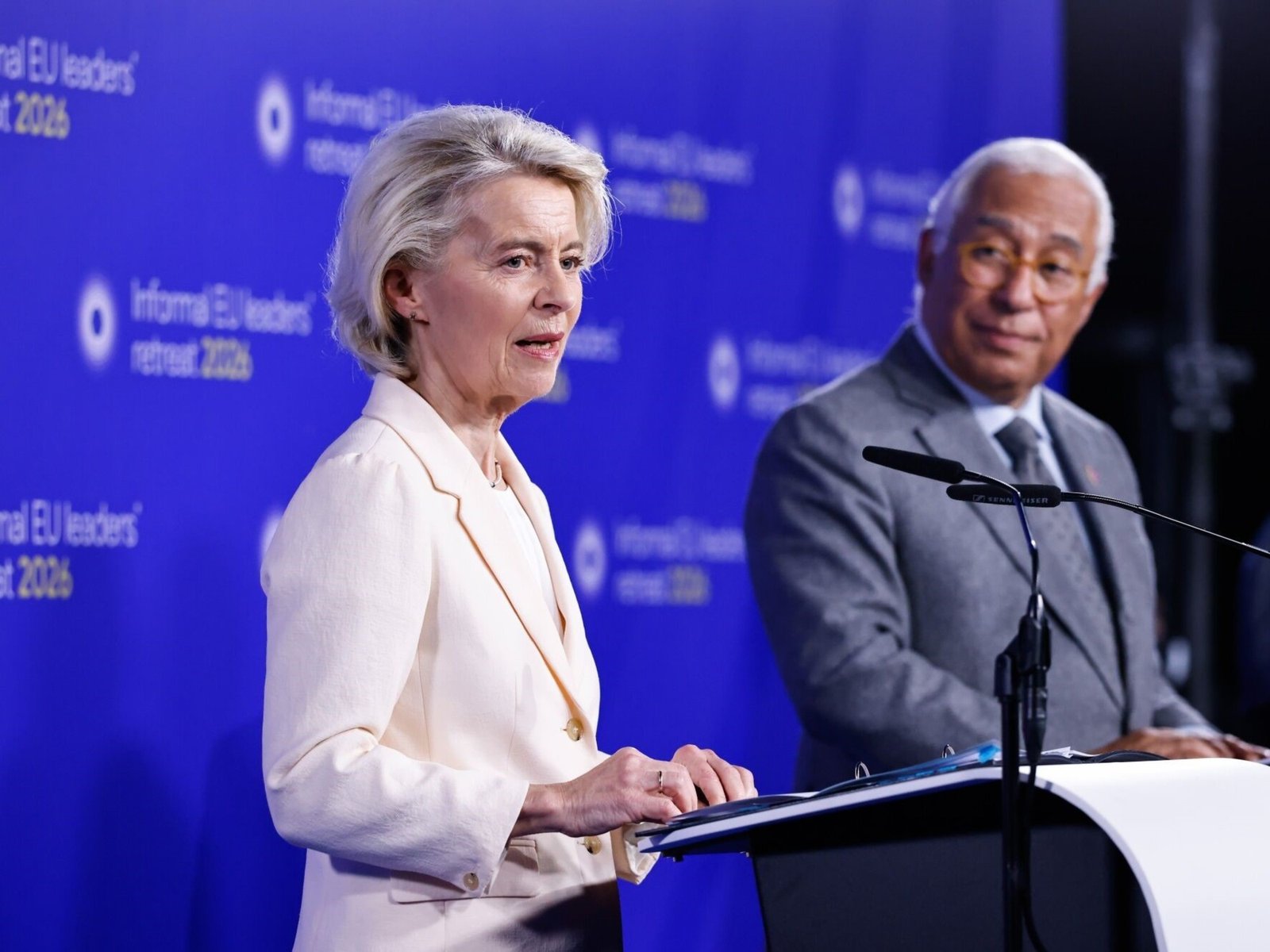
Alden Biesen, un castillo belga del siglo XVI, a tiro de piedra de las fronteras de Alemania y los Países Bajos, sirvió a los dirigentes europeos para celebrar este jueves un “retiro”. Europa vive en un cruce de caminos histórico, después de perder a su gran aliado de los últimos 80 años justo cuando Rusia ataca por el este y China duda entre ser el gran socio o el gran rival comercial.
Los europeos tienen recursos suficientes para sacar la cabeza en este mundo de superpotencias depredadoras: el mercado con mayor poder adquisitivo del planeta con más de 450 millones de personas. Una industria militar que en apenas tres años ha dado un paso delante de gigante y ya arma por sí sola todo el esfuerzo de guerra ucraniano. Una potencia financiera al menos equiparable a la estadounidense. Le faltan recursos energéticos, pero a sus vecinos le sobran. Pero todos esos recursos que tienen no los utilizan eficazmente porque subsisten obstáculos en el mercado interno europeo.
La economía europea va al ralentí, pero ha resistido una grave sucesión de crisis desde la pandemia hasta la guerra arancelaria de Donald Trump pasando por la crisis energética. El desempleo está en mínimos históricos. Y aunque la crisis por la subida del precio de la vivienda es un factor común de preocupación, las expectativas económicas son relativamente optimistas.
Les puede el miedo al cambio. No es sencillo entender que el primo mayor, el que daba seguridad a Europa, puede ser ahora un enemigo que amenace incluso militarmente. Un enemigo que anuncia oficialmente que ayudará a financiar centros de pensamiento y fundaciones que apoyen a los partidos de extrema derecha que quieren destruir la Unión Europea.
La mayoría de los líderes entiende que tiene una amenaza interna, apoyada por Rusia y Estados Unidos, pero responsabilidad europea. Los partidos de extrema derecha en el entorno del 25% de apoyo a nivel continental y amenazando con entrar en gobiernos centrales dentro de un año: en Francia con Marine Le Pen o Jordan Bardella y en España con Santiago Abascal de la mano del Partido Popular.
Nunca desde los años 30 del siglo pasado, en la década que vio la eclosión del fascismo europeo, tuvieron tanto apoyo. Nunca, ni si quiera entonces, el apoyo fue tan general por toda Europa. Portugal, un país vacunado contra el virus del extremismo hasta hace pocos años, vio cómo el candidato ultra alcanzaba el domingo el 35% del voto en el ballotage de las presidenciales.
La otra amenaza es externa, porque por primera vez desde antes de la Segunda Guerra Mundial, en el movimiento de las grandes superpotencias Europa está sola. ¿Cómo se sale de esa trampa? Los europeos creen que es esencial un salto adelante económico que permita reducir dependencias externas y afirmar una política de seguridad, comercial y energética independiente. Todos, desde la derecha radical de la italiana Giorgia Meloni hasta el socialismo del español Pedro Sánchez, coinciden en el diagnóstico. Las diferencias están en las soluciones.
Los dirigentes de la derecha tradicional, como el alemán Friedrichs Merz, o de la derecha radical, como la italiana Giorgia Meloni, abogan por desregular, por eliminar buena parte de la normativa económica europea para dar mucho más margen a las empresas, para ahorrarles costos y permitir actividades que hoy tienen restricciones o están vetadas. Apuestan sobre todo por eliminar restricciones medioambientales y liberalizar los mercados laborales.
Enfrente tienen al francés Emmanuel Macron y al español Pedro Sánchez. Su propuesta es más clásica en el contexto de la Unión Europea y a la vez un salto adelante en la integración del bloque. Ellos abogan por una política europea de reindustrialización y por proyectos comunes en aspectos como energía o defensa que se financien a través de eurobonos, deuda emitida conjuntamente. Defienden la importancia de aprobar ya la normativa que fomentará el “Buy European” e incluso, en el caso del español, dar pasos hacia la creación de unas Fuerzas Armadas europeas.
El retiro sirvió para que el ex primer ministro italiano Mario Draghi, quien presidió el Banco Central Europeo casi una década y el año pasado redactó el gran informe que debe servir de guía a la política económica europea, abroncara a los líderes. Según un funcionario europeo, Draghi les dijo que deben reducir barreras en el mercado interno europeo, movilizar el ahorro europeo para que vaya a inversión productiva dentro de Europa (casi 300.000 millones de euros acaban cada año en Wall Street), reducir el coste de la energía, activar “preferencias europeas” en sectores estratégicos y avanzar en una especie de federalismo pragmático. Que avancen más rápido quienes están dispuestos, como se hizo cuando se creó el euro.

 POLITICA3 días ago
POLITICA3 días agoAcuartelamiento policial en Santa Fe: reclamo salarial y temor a un conflicto nacional de seguridad

 POLITICA2 días ago
POLITICA2 días agoLa advertencia de ATE a los gobernadores que apoyan la reforma laboral: “Firmarán su sentencia de muerte”

 ECONOMIA3 días ago
ECONOMIA3 días agoCuánto le cuesta a la clase media llenar el changuito y cómo varían los precios de los alimentos entre provincias













